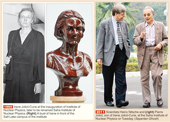 |
A centre of advanced research is hosting a scientist from a family of Nobel laureates 61 years after his mother had inaugurated it.
Pierre Joliot, whose Nobel laureate mother Irène Joliot-Curie had inaugurated the Institute of Nuclear Physics on APC Road in 1950, was in town to deliver a lecture as part of the celebrations of the International Year of Chemistry.
The institute has been rechristened Saha Institute of Nuclear Physics (SINP) and shifted to Salt Lake since.
“I am aware that my mother Irène Joliot-Curie had inaugurated this institute,” Joliot, a biologist at the National Centre for Scientific Research (CNRS) in Paris, told Metro on Tuesday.
The 79-year-old had served as scientific advisor to the French Prime Minister in 1985-86. He was made a commander of Order of Merit in 1982 and conferred Legion of Honour two years later.
SINP professor Susanta Lahiri said the institute wanted someone from the Curie family as speaker in the International Year of Chemistry, that has been dedicated to Joliot’s grandmother Marie Curie. “Pierre Joliot, an eminent scientist in his own right, was the obvious choice.”
Recalling his growing-up years in the company of a host of Nobel laureate scientists, Joliot said: “Everybody around me in the family was engrossed in science. After a while it became my passion. I enjoy the long hours of research in the laboratory like playing a game.”
Joliot’s grandparents Marie and Pierre Curie won the Nobel for physics with Henri Becquerel in 1903 for their research on the radiation phenomena. Marie won a second Nobel (chemistry) in 1911 for discovering radium and polonium.
Joliot’s parents, Irène and Frédéric Joliot-Curie, were jointly awarded the chemistry Nobel in 1935 for their discovery of new radioactive isotopes prepared artificially.
“With four Nobel laureates I thought there was no chance for me and I knew I’ll never be as successful as them. But later I discovered the joy of science in the laboratory,” said Joliot.
Joliot’s sister Hélène Langevin-Joliot is a nuclear physicist at the Institute of Nuclear Physics at Orsay in France, the laboratory set up by their parents.
The veteran researcher feels the greatest challenge faced by scientists in India, as well as in other parts of the world, is a flawed approach to research. “Our society needs support for long-term science projects. I think Pierre Curie wouldn’t have been successful if he had worked now. There is no time for long-term research, everyone wants quick results.”
Joliot termed the tendency of bright students preferring information technology to basic science a global phenomenon. “Young students should be offered opportunities to experiment. It’s a way to allow young minds to pursue creativity. Now teaching is absolutely from outside, nothing comes out from within. There’s little chance to innovate.”
Heino Nitsche, a senior scientist at the Lawrence Berkeley National Laboratory, US, echoed Joliot. “The young people are losing creativity. One needs a balance. The education system must have a strong element of science and mathematics,” said Nitsche, who has also been invited by SINP to deliver a lecture. “India has a huge pool of untapped talent which needs to be nurtured.”
What was Joliot’s impression of Calcutta on his first visit to the city? “Whatever little I have seen of Calcutta since my arrival yesterday, I find it to be a city which moves. I am convinced that if I come back after five years, the city will be completely changed,” the scientist said.










